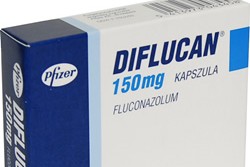Was your baby born with birth defects after you took the anti-fungal drug Diflucan?
Fluconazole is sold under the brand names of Diflucan and Trican, and has been linked to birth defects. The medication is used to treat infections caused by Candida, a type of yeast. The most common infections treated by Diflucan are vaginal yeast infections, esophageal and oropharyngeal yeast infections, and cryptococcal meningitis. The FDA approved Diflucan in 1990, and it is sold by Pfizer in 50 mg to 200mg oral tablets as well as an oral suspension.
Diflucan works by inhibiting an enzyme called “fungal cytochrome P450 enzyme lanosterol 14-alpha-demethylase.” Ergosterol is a component of the cell membranes of the fungi, and is necessary for their survival. The enzyme inhibited by Diflucan does not allow the lanosterol to be converted to ergosterol, therefore the fungi dies out.
Birth Defects Associated with Diflucan
Because of several studies showing birth defects after the mother had taken Diflucan, the FDA issued a warning in August 2011. The warning stated that long-term use of high doses of Diflucan during the first trimester could cause birth defects such as:
- Cranial defects, such as short broad heads
- Abnormal skull developments
- Abnormal facial features
- Cleft lip or cleft palate
- Bowed thigh bones
- Unusually thing ribs and long bones
- Joint deformities
- Muscle weakness
- Congenital heart disease
The FDA changed the pregnancy status of Diflucan from C to D for all uses other than vaginal yeast infections. The studies done showed that the low dose of 150mg per day did not increase risk of birth defects, but higher doses of 400-800 mg significantly increased the risk of birth defects.
Legal Help
If your baby was born with birth defects that you believe to be caused by Diflucan taken during any stage of your pregnancy, you may have a case. It is important to contact us right away to determine the next steps in your situation.




No Comment